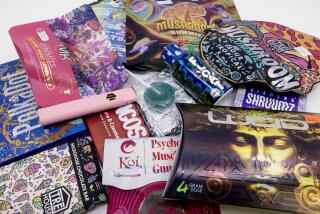Psychedelic drugs may be ready for a medical comeback
New research on the use of psychedelic drugs as treatment for a range of mental disorders appears to be throwing open doors of perception long closed within the medical community, says a new analysis in the Canadian Medical Assn. Journal.
For several decades, the North American medical establishment has classified psychedelic drugs -- including lysergic acid diethylamide (LSD), psilocybin and methylenedioxymethamphetamine (MDMA) -- as drugs of abuse with little to no medical purpose or means of safe use.
That, four researchers argue, is changing.
In Switzerland, Canada, Brazil, Peru, Mexico and the United States, researchers with no evident countercultural tendencies are conducting research that is finding psychedelic drugs a valuable adjunct to psychotherapy in treating addiction, post-traumatic stress and the depression or anxiety that often comes with terminal illness.
While most are small-scale pilot studies, larger trials are planned -- and “more and more people are becoming interested and even jumping into the field to start trials themselves,” said senior author Matthew W. Johnson, a professor of psychiatry and behavioral sciences at Johns Hopkins University.
See an in-depth look at some of that research here.
NEWSLETTER: Get the day’s top headlines from Times Editor Davan Maharaj >>
Clinical investigators are demonstrating that such research “can conform to the rigorous scientific, ethical and safety standards expected of contemporary medical research,” the authors write in the new anaysis, titled “Psychedelic medicine: a re-emerging therapeutic paradigm.” And the body of research they are generating is demonstrating that such drugs as MDMA, LSD and psilocybin can be effective in treating well-chosen patients.
Two other factors -- cost and time -- also appear to be opening minds about the potential therapeutic uses of psychedelic drugs, said Johnson, whose research focuses on addiction treatment.
Experimental therapeutic uses of psychedelic drugs have been tightly controlled, requiring extensive screening of prospective patients, close monitoring during medication use, and extended follow-up. But for all of that, when psychedelics such as MDMA have been tested in conjunction with psychotherapy for PTSD, or psilocybin for alcohol dependence, “relatively time-limited interventions” have been shown to have enduring benefits.
At a time when economy is sought in medical care, that may reveal psychedelics to be an “economically viable” alternative to existing therapies, the authors wrote.
And the passage of time since psychedelics gained notoriety in the 1960s appears to have made a reasonable assessment of their potential worth possible, Johnson said.
“It’s been a long road -- this started back in the mid-late 1990s when the [U.S. Food and Drug Administration] started to approve some of these very early studies,” he said in an interview. “It’s been a cautious road, but one that’s data-driven. A big factor is really that enough time has passed for the sensationalism to kind of simmer down and for sober heads to say, ‘Hold on, let’s look at the evidence.’”
Follow me on Twitter @LATMelissaHealy and “like” Los Angeles Times Science & Health on Facebook.
MORE SCIENCE NEWS:
From icky bugs to good grub: Why more people are eating insects
E-cigarettes: Teens who vape are more likely to smoke later, study says
Diabetes nation? Half of Americans have diabetes or pre-diabetes







